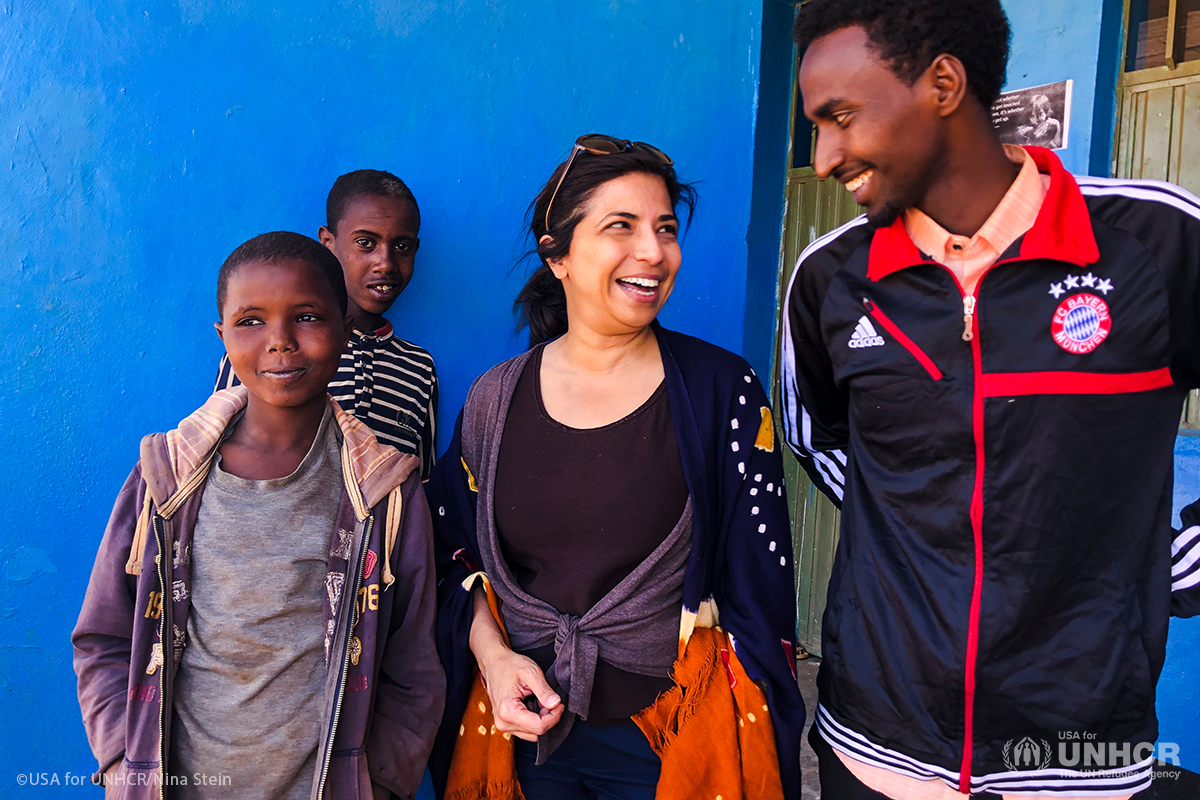USA for UNHCR board member reflects on Ramadan and helping refugees during the holy month
Originally from Pakistan, Yasmin Causer is a USA for UNHCR board member, a retired partner from a public accounting firm in Boston, Massachusetts and a practicing Muslim.
USA for UNHCR Communications Manager Nicholas Feeney recently sat down with Yasmin to talk about how her family celebrates Ramadan, how the COVID-19 pandemic has forced families to get creative to celebrate the holy month and why she thinks other Muslim-Americans should donate their Zakat to support refugees.
How did your family celebrate Ramadan growing up?
I grew up in Pakistan and as a child we would go to the mosque every day during Ramadan. People would work in the morning, get up to eat before the fast, then pray and then go to work. In Pakistan, everything would shut down by 2 p.m. and people then rested until it was time to go to the mosque. In Islam, congregation is a big thing. We're supposed to congregate at least once a week, by going to the mosque on Fridays. But during Ramadan, it was always very festive and a real feeling of the community coming together. Just a very happy time.
Ramadan is a time for fasting, prayer and generosity, but it is also very social and communal, how has COVID-19 impacted the way your family has celebrated?
Celebrating Ramadan in 2020 was surprisingly great. My oldest son and his wife joined us in our home. We had a very spiritual Ramadan and on the holy nights, we would sit and read the Quran and discuss the passages. We read translations, found commentary on the internet and would also listen to lectures and then discuss what it meant to each other. It was a very spiritually rewarding time.
This year, more is happening via Zoom and we're connecting with friends and relatives from all over the world. The world has become smaller in a sense. Congregating has changed. We're more in touch with our family members thanks to the technology. We’re getting together through Zoom, putting our computer on the table and eating at the same time. Everybody in different places. It's different but we're maintaining the communal aspect of Ramadan.
 Yasmin meets with refugees in Ethiopia in 2018.
Yasmin meets with refugees in Ethiopia in 2018.
For many refugees, observing Ramadan, even in the most trying circumstances, is a way to help create a sense of normalcy, a sense of community and recapture a little bit of their previous life back home. Have you ever observed Ramadan away from home? How did you build your community in an unfamiliar place?
I came to the U.S. as a college student and for many years I lost touch with celebrating Ramadan. But when my kids were born, it became more important that I fulfill my obligation and that they learn about the tradition. I started seeking out fellow Muslims during the holy times like Ramadan. We would try to replicate our celebrations, but we didn't have a mosque, so we would congregate together in people's homes. My house became the place where people gathered for the big events. To this day, this still happens. We have mosques nearby, but we still prefer the smaller, intimate gathering because our kids still need guidance when they're praying and it's easier when we're all in the same room.
Can you explain what Eid is and how you celebrated last year?
Eid al-Fitr, which comes immediately after Ramadan, is a big community celebration. It's a time where you reconnect with people and visit their homes – there are always a lot of sweets, a lot of food. It's a happy time. You've prayed. You’ve fasted. You feel like you are cleansed and you are reborn in a sense. It's a new you. It's all good, all positive energy, and you're just celebrating together, and that's why everybody looks forward to it.
Since we couldn’t visit friends and family last year, Eid was a bunch of Zoom parties and people sent goodies to everybody's home to celebrate. It was a lot of food. A lot of sweets.
USA for UNHCR has 100 percent approval to accept Zakat – why do you believe Muslim-Americans should support refugees during Ramadan?
In the Quran, Zakat has very specific rules as to how the money is to be distributed. Zakat is usually distributed to your fellow Muslims in need. It's a serious obligation. It is one of the pillars of Islam and so when I give I want to make sure that it is done the right way. Refugees are going through hardships where they are deprived of food and water and shelter. But one thing we see in refugees is how resilient they are.
I was very excited when I learned of the USA for UNHCR Zakat Refugee Fund. UNHCR is committed to ensuring that these funds are collected and spent on efforts that meet the Zakat requirements and help refugees directly.
I feel very comfortable with the effort UNHCR and all the partnering organizations make to ensure that the Zakat obligation is fulfilled in the appropriate manner. The Zakat Refugee Fund is where my Zakat is going this year.
How you can help
This year, many refugee families will be observing the holy month of Ramadan in extreme poverty and away from their homes. Your support can help them cover their immediate needs and restore hope for a better future. Whether through Zakat or Sadaqah, it only takes a few seconds to share the blessings this Ramadan.


